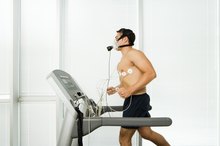What Are Normal Blood Pressure Results During a Stress EKG?
An exercise stress test is normally used to determine if there are any underlying cardiovascular problems. The test is useful in eliciting signs or symptoms of cardiovascular disease. In addition to using an ECG (EKG) to look at the functioning of the heart, there are also blood pressure responses to graded exercise to aid in the physician's evaluation.
Normal Systolic Blood Pressure Response
The normal response of systolic blood pressure to upright dynamic exercise used during an ECG test is a gradual increase. As the workload is progressively increased, systolic blood pressure is expected to rise as well. Blood pressure may plateau when peak exercise or exhaustion is reached.
Normal Diastolic Blood Pressure Response
Treadmill Ramp Test Protocol
Learn More
It is normal during a stress ECG for the diastolic blood pressure to remain the same or to even drop slightly.
ECG Stress Test Endpoints
A stress test will usually be terminated if any signs or symptoms such as ECG changes or chest pain appear. Blood pressure responses that will end a test include a drop in systolic blood pressure that is greater than 10 mm Hg after an increase in work intensity, a systolic blood pressure greater than 250 mm Hg, or a diastolic blood pressure greater than 115 mm Hg.
Abnormal Systolic Blood Pressure Responses
Diastolic Blood Pressure During Exercise
Learn More
An abnormal systolic blood pressure response to a graded exercise test would include a drop of more than 10 mm Hg from the baseline measurement when workload is increased. A systolic blood pressure that fails to rise to greater than 140 mm Hg at peak or maximal exertion is also considered abnormal.
Abnormal Diastolic Blood Pressure Response
While diastolic blood pressure is not as indicative of heart disease as systolic blood pressure, a diastolic blood pressure that is greater than 115 mm Hg is considered a hypertensive response to exercise. The exercise test will be terminated in this case.
A "Normal" Result
Blood pressure is a dynamic measurement of the cardiovascular system. The systolic and diastolic values are constantly changing due to exercise, posture, medication and time of day. There is no "correct" number during a stress ECG. Rather, the physician will look at the blood pressure response to the test along with a host of other measurement data to form a prognosis.
Related Articles
References
- "ACSM's Guidelines for Exercise Testing and Prescription, Eighth Edition"; Walter R. Thompson, PhD, FACSM, Senior Editor; 2010
Resources
Writer Bio
Don Jay Garrett is an anatomy and physiology instructor for nursing students. He also teaches CPR for local hospitals. Garrett holds a Master and a Bachelor of Science in exercise science. Previously, he was in the health and fitness field for more than 12 years, working as a fitness manager, exercise physiologist and personal trainer.









